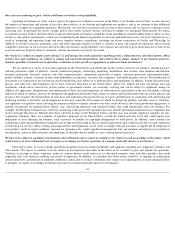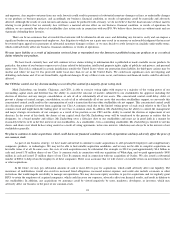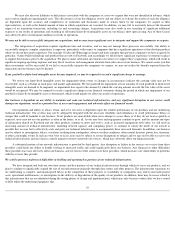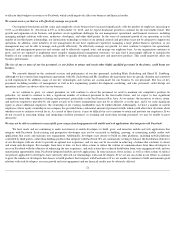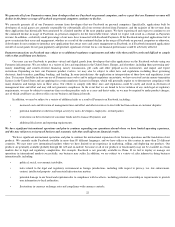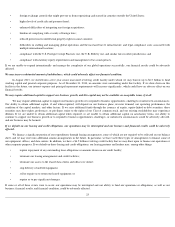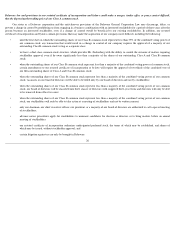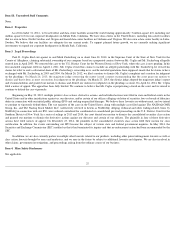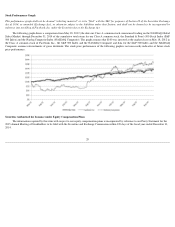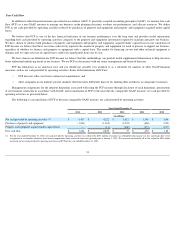Facebook 2014 Annual Report Download - page 24
Download and view the complete annual report
Please find page 24 of the 2014 Facebook annual report below. You can navigate through the pages in the report by either clicking on the pages listed below, or by using the keyword search tool below to find specific information within the annual report.
to allocate their budgets or resources to Facebook, which could negatively affect our business and financial results.
We cannot assure you that we will effectively manage our growth.
Our employee headcount and the scope and complexity of our business have increased significantly, with the number of employees increasing to
9,199
as of December 31, 2014 from 6,337 as of December 31, 2013, and we expect headcount growth to continue for the foreseeable future. The
growth and expansion of our business and products create significant challenges for our management, operational, and financial resources, including
managing multiple relations with users, marketers, developers, and other third parties. In the event of continued growth of our operations or in the
number of our third-
party relationships, our information technology systems or our internal controls and procedures may not be adequate to support our
operations. In addition, some members of our management do not have significant experience managing a large global business operation, so our
management may not be able to manage such growth effectively. To effectively manage our growth, we must continue to improve our operational,
financial, and management processes and systems and to effectively expand, train, and manage our employee base. As our organization continues to
grow, and we are required to implement more complex organizational management structures, we may find it increasingly difficult to maintain the
benefits of our corporate culture, including our ability to quickly develop and launch new and innovative products. This could negatively affect our
business performance.
The loss of one or more of our key personnel, or our failure to attract and retain other highly qualified personnel in the future, could harm our
business.
We currently depend on the continued services and performance of our key personnel, including Mark Zuckerberg and Sheryl K. Sandberg.
Although we have entered into employment agreements with Mr. Zuckerberg and Ms. Sandberg, the agreements have no specific duration and constitute
at-will employment. In addition, many of our key technologies and systems are custom-
made for our business by our personnel. The loss of key
personnel, including members of management as well as key engineering, product development, marketing, and sales personnel, could disrupt our
operations and have an adverse effect on our business.
As we continue to grow, we cannot guarantee we will continue to attract the personnel we need to maintain our competitive position. In
particular, we intend to continue to hire a significant number of technical personnel in the foreseeable future, and we expect to face significant
competition from other companies in hiring such personnel, particularly in the San Francisco Bay Area. As we mature, the incentives to attract, retain,
and motivate employees provided by our equity awards or by future arrangements may not be as effective as in the past, and if we issue significant
equity to attract additional employees, the ownership of our existing stockholders may be further diluted. Additionally, we have a number of current
employees whose equity ownership in our company has provided them a
substantial amount of personal wealth, which could affect their decisions about
whether or not to continue to work for us. As a result of these factors, it may be difficult for us to continue to retain and motivate our employees. If we
do not succeed in attracting, hiring, and integrating excellent personnel, or retaining and motivating existing personnel, we may be unable to grow
effectively.
We may not be able to continue to successfully grow usage of and engagement with mobile and web applications that integrate with Facebook.
We have made and are continuing to make investments to enable developers to build, grow, and monetize mobile and web applications that
integrate with Facebook. Such existing and prospective developers may not be successful in building, growing, or monetizing mobile and/or web
applications that create and maintain user engagement. Additionally, developers may choose to build on other platforms, including mobile platforms
controlled by third parties, rather than building products that integrate with Facebook. We are continuously seeking to balance the distribution objectives
of our developers with our desire to provide an optimal user experience, and we may not be successful in achieving a balance that continues to attract
and retain such developers. For example, from time to time, we have taken actions to reduce the volume of communications from these developers to
users on Facebook with the objective of enhancing the user experience, and such actions have reduced distribution from, user engagement with, and our
monetization opportunities from, Facebook-
integrated mobile and web applications. In some instances, these actions, as well as other actions to enforce
our policies applicable to developers, have adversely affected our relationships with such developers. If we are not successful in our efforts to continue
to grow the number of developers that choose to build products that integrate with Facebook or if we are unable to continue to build and maintain good
relations with such developers, our user growth and user engagement and our financial results may be adversely affected.
21







